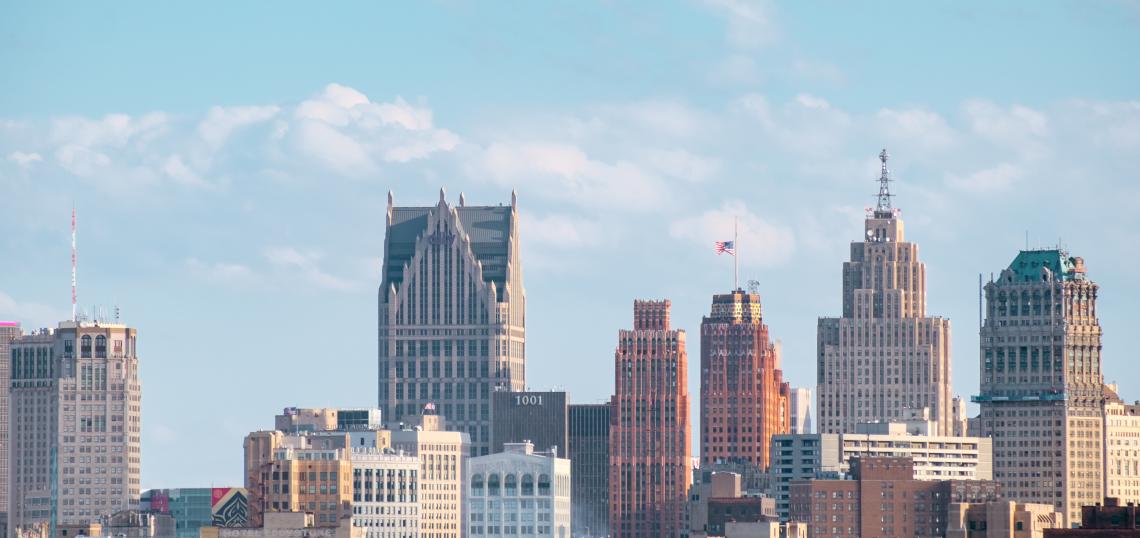Last week, Bedrock announced new plans for the Monroe site, a development they "broke ground" on a little over four years ago. The plans blend some old (National Theatre) with the new, along with an entertainment venue, market, retail, office, and residential space. Some of it might not break ground until 2028, which seems far off, but it's not.
Developing this site will fill in another (mostly) vacant site downtown. We've seen a lot of that over the past 10 years. So what will the city look like in another 10 years?
Before we move forward, let's take a look back. In 2013, Detroit filed for bankruptcy. What has changed since?
- Dan Gilbert & Bedrock have bought numerous buildings downtown, rehabbed them, and put them to use. They're currently building a skyscraper on the Hudson's site and rehabbing the Book Tower. They've also moved outside of downtown, snagging property recently along the East Riverfront and Corktown.
- The Joe Louis Arena was demolished and the Little Caesars Arena was built. A 25-story residential tower is currently under construction at the JLA site, and a hotel will soon follow.
- Apartment buildings have gone up in West Village, Lafayette Park, Southwest Detroit, Corktown, Piety Hill, New Center, and more, while older apartment buildings across the city continue to be rehabbed.
- We saw big plans for the Packard Plant, which was unfortunately too big to take on. It's currently being demolished.
- Michigan Central Station, which stood empty for decades, will open later this year thanks to Ford. They've also rehabbed the neighboring Book Depository, and will turn the area into a mobility campus.
- Brush Park, which used to have acres of vacant land, has been filled in with apartment buildings and townhouses, and is now one of the more expensive neighborhoods in the city.
- The Riverwalk has expanded, and will soon reach from the Ambassador Bridge to Belle Isle.
- The Qline runs up and down Woodward. But transit in general hasn't seen many significant changes in the region.
- Residential real estate prices have risen significantly (goodbye $500 houses), but the city is still much more affordable compared to many other metro areas.
And there's plenty more. So what do we know is coming?
- The Detroit Center for Innovation will bring an academic and economic boost to downtown. Around it, Olympia and Related Companies have plans for 10 new or rehabbed buildings.
- Henry Ford Health and Tom Gores recently announced a $2.5 billion development across New Center. Will we see more development in nearby neighborhoods (including the Herman Kiefer project)?
- Once Bedrock finishes the Hudson's site and Book Tower and starts on the Monroe blocks, what other projects might they take on?
- The Joe Louis Greenway will connect neighborhoods throughout the city.
- Work might eventually start on 375 in the next few years.
There's so much to consider, and we have a lot of questions. Many areas across the city still need a lot of attention. While the city has focused on bringing more affordable housing online, the Area Median Income used to determine affordability isn't accurate for Detroiters, since some suburban cities are included. Can we get more industry, business, and jobs into the city and start to increase the income of Detroiters? Can we become a competitive big city for business without substantial transit changes? Will we ever get offices filled up again like "before times?" If not, what can we do with some of this office space? While so many buildings have been rehabbed, others could use some help (we're looking at you, Penobscot).
Let's hear from you. What do you want the city to look like in the future? What kinds of changes now can lead to success for all Detroiters down the road? Let's hear it in the comments below.






